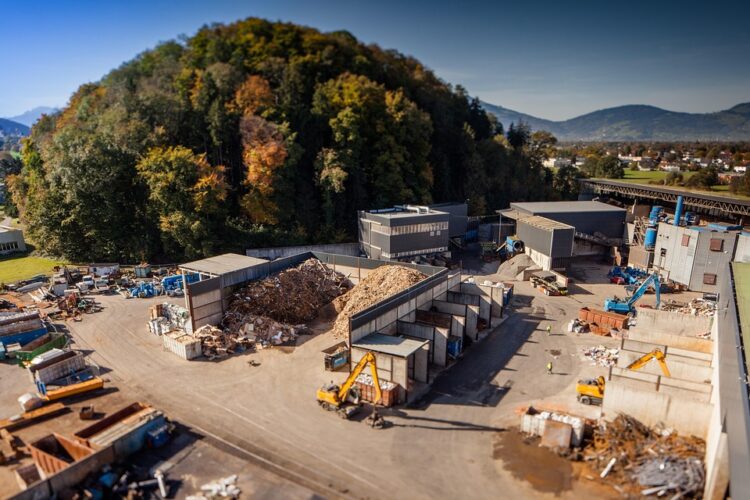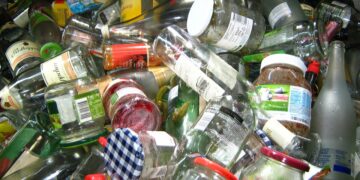[ad_1]
Revolutionizing Recycling: A Greener Future for Our Planet
As concerns about climate change and environmental degradation continue to grow, the need for sustainable solutions has never been more pressing. One area that has seen significant advancements in recent years is recycling. By revolutionizing the way we recycle, we can create a greener future for our planet and reduce the impact of waste on the environment.
The Benefits of Recycling
Recycling offers a range of benefits, both for the environment and for society as a whole. By recycling materials such as paper, plastic, glass, and metal, we can reduce the amount of waste that ends up in landfills, where it can take hundreds or even thousands of years to break down. This not only helps to conserve valuable resources but also reduces the emissions of greenhouse gases that are released when waste decomposes.
Recycling also helps to save energy, as it requires less energy to produce products from recycled materials than it does to create them from raw materials. This can help to reduce our reliance on fossil fuels and decrease our carbon footprint. Additionally, recycling can create jobs and stimulate economic growth, as the recycling industry continues to expand and create new opportunities for workers.
The Challenges of Traditional Recycling
While recycling offers many benefits, traditional recycling methods have their limitations. One of the biggest challenges is contamination, which occurs when non-recyclable materials are mixed in with recyclables. This can reduce the quality of the recycled materials and make them less valuable, leading to higher costs for recycling facilities.
Another challenge is the lack of infrastructure for recycling certain materials, such as electronics or hazardous waste. These items can be difficult to recycle and often end up in landfills, where they can pose a threat to the environment and human health. Finding sustainable solutions for these materials is essential for a truly effective recycling system.
Revolutionizing Recycling
To address these challenges and create a more sustainable recycling system, innovative solutions are needed. One approach that is gaining traction is the use of advanced sorting technologies, such as optical sensors and artificial intelligence, to improve the efficiency and accuracy of recycling processes. These technologies can help to reduce contamination and ensure that materials are sorted correctly, increasing the quality of the recycled materials.
Another promising development is the concept of extended producer responsibility, which holds manufacturers accountable for the end-of-life disposal of their products. By requiring manufacturers to take responsibility for recycling their products, this approach can help to incentivize the design of more sustainable and recyclable products, reducing the burden on consumers and recycling facilities.
Key Innovations in Recycling
Several key innovations are driving the revolution in recycling and paving the way for a greener future. One of the most exciting developments is the rise of chemical recycling, which uses advanced processes to break down plastics into their basic building blocks, allowing them to be reused to create new products. This technology has the potential to revolutionize the recycling of plastics and reduce our reliance on fossil fuels.
Another important innovation is the development of biodegradable materials, which can break down naturally in the environment without harming ecosystems. By replacing traditional materials with biodegradable alternatives, we can reduce the amount of waste that ends up in landfills and oceans, helping to protect wildlife and preserve natural habitats.
The Role of Individuals in Recycling
While technological advancements and policy changes are important for revolutionizing recycling, individuals also play a crucial role in creating a greener future. By reducing, reusing, and recycling materials in their daily lives, individuals can help to reduce waste and conserve resources. Simple actions such as using reusable bags, bottles, and containers can make a significant impact on the environment and contribute to a more sustainable future.
Education is also key to promoting recycling and environmental stewardship. By raising awareness about the importance of recycling and providing information on how to properly dispose of different materials, we can empower individuals to make informed choices and take action to protect the planet. Schools, businesses, and community organizations can all play a role in promoting recycling and sustainability initiatives.
Conclusion
Revolutionizing recycling is essential for creating a greener future for our planet and reducing the impact of waste on the environment. By embracing innovative technologies, promoting extended producer responsibility, and fostering individual action, we can build a more sustainable recycling system that conserves resources, reduces emissions, and protects ecosystems. Together, we can work towards a world where recycling is not just a choice, but a way of life.
Let’s join hands and make a difference for a better tomorrow!
[ad_2]












